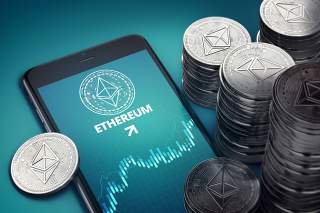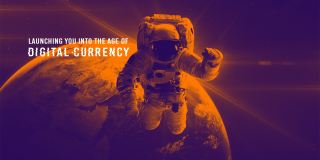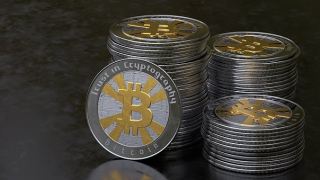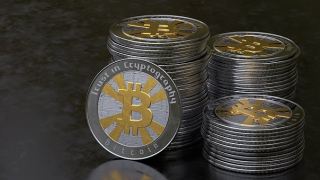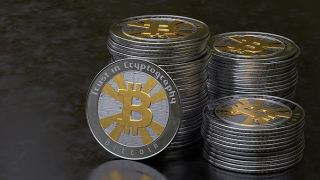The Future is Crypto
As the cryptocurrency market continues to evolve, Daniel Kibel, Co-Founder of CMTrading, discusses its potential performance in years to come.
“The cryptocurrency market has experienced huge rallies recently. And while there's not a lot you can count on in online trading, cryptocurrency being volatile is one thing that has been pretty constant over the last two years. Bitcoin (BTC) has experienced its biggest rally in the past few months, as the ‘premium’ cryptocurrency breached the psychological milestone of hitting the $50,000 level in August. Just shy of three months later (at the time of writing), Bitcoin is now sitting at over 66 000. Similarly, rival cryptos like Ethereum and Ripple have also seen huge price increases to around $4,700 and $1.25 respectively.
“It’s worth mentioning that the crypto market, especially Bitcoin, saw record highs and disastrous lows earlier in 2021. Despite its tumultuous performance, though, there remains a tremendous amount of wealth to made with the total crypto market valued at more than $2 trillion.
Trading crypto in South Africa
“South Africa has seen a rapid increase in the number of crypto assets traded locally. In June 2021, the South African treasury revealed that there are at least two million local retail investors in crypto, amounting to $2 billion in transaction volumes.
Given crypto’s history of volatility, the current increase doesn’t guarantee a long-term reversal. As a spike in prices ripples through the crypto market, many traders are asking – ‘Is now a good time to invest in crypto?’
What’s driving the recent crypto rally?
“Bitcoin, and in fact the entire crypto market, has proven to be an asset that’s prone to huge price movements based on rumours and events. PayPal recently announced it would allow customers in Britain to use Bitcoin and other cryptocurrencies. This provides more legitimacy for the entire crypto market and ultimately begins a chain reaction of buying, driving up the price of all digital coins.
Is Bitcoin worth investing in? What does it take to make a profit?
“Bitcoin is like any asset. If you buy it and it goes up, you make a profit, and if it drops you lose money. The issue is the huge price movements seen in Bitcoin – often thousands of dollars. If the low is about $47,000 and the upside high is $68,000, that's a really big move for the majority of traders. It does, however, mean you need a lot of capital. That said, we’ve seen daily movements from $5000 to even $10,000. This makes crypto a huge risk, though there are many people making money.
“Sadly, a lot of people are still losing large sums of money, because even though they've correctly judged the price direction, they lose out due to funding. For instance, if you were to buy Bitcoin earlier in August, you would’ve bought it at $48,000 and it went up to a high of around $68,000. That’s good news, right? But if it falls all the way back down to $47,000 (which is not impossible), that’s an obvious loss. There are always big moves in the crypto market and it's something that people need to be aware of.
Just how risky is crypto trading?
“Personally, I much prefer trading currencies or indices because they're more stable. They don't move in the huge amounts that crypto does. But it's super high risk and sees extremely high returns. Due to the size of a single Bitcoin, with the value of it currently nearing $67,000, you need a lot of money just to be able to hold a position in the crypto market.“
Will we see widespread adoption of crypto?
“I believe it's already happening. The future is without any question crypto. What remains to be seen is whether it’s through Bitcoin or some other crypto asset. I don't think there's any question that crypto is the future. “We’re seeing the adoption of crypto by some of the largest financial companies in the world. It's clear that when one starts, people believe in a snowball effect; if one starts then, every other company will start accepting crypto.
Anything to note when trading crypto
“Be very careful and come to terms with the huge volatility in the market. You must be patient and understand that you might not have enough money to hold a position if the trend goes against you. It's a good market and traders are making a lot of money. You need to have enough capital so that even when the market goes against you, you can still hold your position.”
Follow CMTrading on Facebook, LinkedIn, Twitter, and YouTube.
For more information on CMTrading, visit their official website at www.cmtrading.com or call +27105008026, and one of their friendly staff will assist you.
CMTrading is the brand name of Global Capital Markets Trading Ltd (A Seychelles company, company no. 104785)
10 Reasons Why Africa Will Set the Pace for Bitcoin Adoption.
As it stands at the moment, Africa is lagging behind the rest of the world when it comes to the adoption of Bitcoin and other cryptocurrencies.
View Bitcoin Price to South African Rand https://www.sashares.co.za/bitcoin-to-rand/
Africa’s interest in the currency is not translating into real-life use, and there are a variety of reasons why this is the case.Crypto experts are noticing something that could change this current start of cryptocurrency and there are even economists who are predicting that these currencies will be the next big economic innovation that will have a positive disruptive influence.The many advantages that the average African will experience are the exact reason why widespread adoption of Bitcoin is a likely reality.
Open a Free Bitcoin Wallet here https://www.luno.com/en/signup?utm_source=sashares&utm_medium=affiliate
1. Pegged against the dollar
Even the strongest currencies in Africa struggle against the US dollar, the primary currency in which Bitcoin is traded. The Rand, in particular, is struggling more than ever, depreciating as the country tries to solve its current economic woes by simply creating more. Many Africans are looking for a way to add more value to their money and by converting cash into cryptocurrency, or by taking the extra step and mining it themselves, they can do just that.
2. Instant payment between people
Awaiting payment slows down businesses and often some of the biggest banks on the continent have a delayed payment protocol while they do offer instant payment at an additional cost. Instant payment benefits both the payer and the payee and with cryptocurrency, this aspect is greatly beneficial to e-commerce in particular, which in emerging economies can go a long way towards encouraging entrepreneurship
3. Secure encrypted wallets More than 2 million people already have a secure Bitcoin wallet, which means there are already 2 million people ready to trade. Unlike the risks involved with cash and card transactions, Bitcoin and other cryptocurrencies are safe to transact with and cannot be stolen or lost.
4. Bitcoin is fast becoming a part of many stock and wealth portfolios
Bitcoin and similar currencies are being used by all kinds of traders to diversify their portfolios and in most cases, they are enjoying a fairly good return on their investments. For many traders, Bitcoin has become an investment alternative it generally remains profitable. Global Stocks hasn’t outperformed bitcoin in 10 years
5. Africa already uses instant mobile payments Africans are no strangers to mobile currencies, which are just one step away from cryptocurrencies. Zimbabweans use EcoCash for just about all of their payment needs, continuing to buy and sell even though the country’s currency has collapsed. The framework is for the most part already in place for cryptocurrency to swoop in and make its mark.
6. Bitcoin is down 60% from its all-time high price
This means that there has possibly never been a more affordable time for Africans to invest in Bitcoin. Past trends have shown that Bitcoin normally picks up again, and despite what the naysayers believe, the currency shows no sign of disappearing completely, or becoming financially nonviable, any time soon.
7. Supply and demand
Unlike other currencies which tend to supply a nearly limitless amount of notes and coins, Bitcoin is governed by a supply and demand set up. There are only 21 million Bitcoins in existence and demand has the power to drive up the currency value
8. Crypto is becoming mainstream with Bitcoin in the forefront.
Although not everyone knows or understands the complexities of these currencies, if you were to ask anyone what cryptocurrency is, their answer is likely to be Bitcoin. This is because Bitcoin has become the name synonymous with cryptocurrencies of all kinds and when people hear that there is money to be made, they take an interest.
9. Bitcoin is decentralized and not governed by any government institution. This is arguably one of the most appealing things about Bitcoin. A decentralized currency of this kind protects users from bank collapses, bank fees and various bank policies that affect the value of their currency or determine how and to whom they may make transactions. A decentralized currency is also untouched by geographical borders and will enjoy cheaper international transactions. This type of currency is also unaffected by both inflation and deflation because it doesn’t belong to one single country.
10. Bitcoin is unaffected by global recessions The global economy is on the brink of collapse as a massive amount of debt and economic downturn characterize many economies. Numerous economists are expecting a crash bigger than that of 2008 to come sooner rather than later. centralized currencies are certainly in the firing line when this happens, but the decentralized cryptocurrencies are at the moment the safest option for anyone wanting to protect their wealth.
SHOKOCAST - The Most Innovative Social Music Platform Built On A Global Decentralised Blockchain Network
NEWS PROVIDED BYNEWS PROVIDED BYshokoCAST.ioApr 26, 2018JOHANNESBURG, South Africa, April 26, 2018/ - shokoCAST, a global social music innovation platform, launches its social music platform that is set to be the most disruptive and innovative social music platform globally despite it having an African focus and especially in areas that have the most basic of technology infrastructure. The platform will seek to revolutionise the music, telecommunications and advertising value chains whilst benefiting musicians and music lovers everywhere.shokoCAST is a social music platform that brings about the rebirth of sound and evolution of music by converging the entire music value chain whilst bringing the artist directly to the fans. It’s a place where musicians build careers, fans find inspiration and managers discover talent! shokoCAST is a global decentralized free social music network built using Technology Innovations that are based on Multiple Interdependent Disruptions to the music industry on a hybrid quadruple layered blockchain called SHOkolah. The platform will enable the creation of music by artists and beatmakers and DJs, collaboration amongst users and sharing including the creation of 'communities with similar tastes', publishing and royalty administration; digital distribution; and consumption and monetization avenues that include downloads and streams and many new forms of revenue creation.
"We are very proud to be creating such an innovative solution that is second to none and which puts shokoCAST on track to be a global player. We have undertaken a crowdfunding campaign that is open to everyone and brings tremendous benefits to the musical industry, artists in particular, and also to those who invest in convertible notes and digital assets. We invite everyone from across the continent to join us as we build a social music platform that is relevant not just to Africa, but the world," says Therry Martins, CEO and Founder of shokoCAST.
In emerging economies, higher are the hurdles you would need to jump to even consider releasing a track worse a career. Trying to invest time promoting your solo career is even more daunting as you would need to keep sync of all the different social platforms and conversations whilst keeping relevant. This is assuming you have the resources to create and publish music. Digital and online distribution has added to the evolution of the industry to a point where streaming accounts for over 60% of revenue. Blockchain technologies and the use of cryptocurrencies holds great prospects for Africa especially when considering their construct with benefits that include decentralisation, consensus and cryptography and the fact that it simply provides trust within a system of unknown users [1]. It is worth noting that even the World Economic Forum is cognizant of its potential in the banking industry with its report on the future of the financial infrastructure [2]. The SWIFT Institute also expects “substantial reductions in both cost and risk” within certain business areas of financial services [3]. Blockchain has the potential of economic evolution based on its impact to baseline industries, for example, blockchain could affect, among other business models, clearinghouses, exchanges, brokers, or remittances in capital markets, real-time money transfer, cryptocurrencies, and settlement markets, insurance also holds potential for blockchain technology applications. Blockchain capabilities are also instrumental in improving business processes like easier fraud detention and reduced administration costs through the use of smart contracts [4].
“To create an effective social music ecosystem centred on innovation, shokoCAST is the best platform that offers an integrated solution that converges the value chains whilst encouraging changing digital lifestyles and music needs through the use of disruptive technologies that promote industry convergence, all for the benefit of society,” says Therry Martins, CEO and Founder of shokoCAST. “We are committed to completing our crowdfunding campaign and launching our platform as soon as possible.”
More about shokoCAST
shokoCAST will offer a simple UI/UX for users that include 3 key user groups: music makers (artist, songwriters, vocalists, beatmakers, and DJs), music movers (fans, distributors, producers, our dRadio, other streaming platforms, everything digital) and music managers (record labels, collection societies, governmental departments in some countries, advertising companies, support service providers e.g. photography and recording studios). Key features include:
- shokoCAST the platform that enables the user creation of music, collaboration amongst users and sharing including the creation of 'communities with similar tastes'; publishing and royalty administration; digital distribution; and consumption and monetization avenues that include downloads and streams and many new forms of revenue creation;)
- suPERFORMER for monetization in addition to shokoCAST through live video, 360 video and augmented reality streaming, live concerts and events, ticketing, etc.;
- Audio curated music playlists on digital radio or dRadio for those would prefer to listen to great sounds during their busy day;
- A fully fledged transactional wallet called shokollet that hard-wires the solution to the blockchain providing full transactional capabilities on the network and with other cryptocurrencies and services
- Socialing that unites users and groups; and
- The secure and anonymous messenger called SHUSH! that is also the backbone to an uncensored news feed and user engagement.
- All on a quadruple layered hybrid blockchain called SHOkolah.
All actions and activities by users is rewarded by SHK tokens which is exciting as it’s the fuel by which music is built, traded and even promoted. Aspiring artists now have the means of exploiting these social incentives to build their careers! All this is possible thanks to the many technology innovations developed by the shokoCAST specialists and ties to the decentralized super-network. Having adopted a differential niche strategy that is very attractive to emerging economies as we will be building on partnerships in these countries.
For more information visit https://www.shokocast.io or contact This email address is being protected from spambots. You need JavaScript enabled to view it.
[1] Deloitte, Blockchain: Democratized trust - Distributed ledgers and the future of value, Tech Trends 2016: Innovation in the digital era, Deloitte University Press, 2016.
[2] WEF, The future of financial infrastructure, World Economic Forum, 2016.
[3] M. Mainelli and A. Milne, The Impact and Potential of Blockchain on the Securities Transaction Lifecycle, SWIFT Institute Working Paper, SWIFT Institute, 2016
[4] McKinsey, Blockchain in insurance – opportunity or threat?, Insurance, McKinsey, 2016..
Digital Asset Exchange Launched in South Africa
A new, digital asset exchange – ChainEX – has been launched on the world wide web.
“ChainEX is the only digital asset exchange that provides a platform for South Africans to buy, sell or trade up to 20 different digital assets - using the South African rand as the default fiat-buying currency for some.”
Director Otto Lessing said ChainEX’s mission is to provide a world-class platform to benefit every South African by providing them with easy access to global crypto markets. Recent statistics, he said, indicated that SA topped the list of countries with the most Google searches for the cryptocurrency Bitcoin. Slovenia is second, followed by Austria, the Netherlands and Australia. Bitcoin is also the most searched term on Investopedia, the world’s largest financial education website.
ChainEX is playing its part in meeting the world’s ever-increasing appetite for cryptocurrencies, said Lessing. “The increased interest in cryptocurrencies comes as no surprise as more and more people are looking to get involved in this exciting opportunity.” After starting 2017 at a market cap of USD17.7-billion, according to CoinMarketCap, he said the value of the cryptocurrency market surged by more than 1 200 per cent during the course of the year. However, he warned, the increased amount of interest also had a downside. “Digital asset exchanges are increasingly struggling with the massive influx of users, which results in them experiencing frustrating delays when trying to access or transact on the platforms. “ChainEX strives to alleviate this problem by providing a trading platform that is secure, user-friendly and reliable with a well-tested, highly scalable matching engine.”
Plans include expanding its asset base by introducing more digital asset currencies to its trading platform, thereby providing South African users with a better experience and more exposure to the world of cryptocurrencies. “There is also a possibility to present a platform to South African-based companies where their newly launched ICO (Initial Coin Offering) tokens can be traded on,” said Lessing.
Visit www.chainex.io for more information.
What Is Bitcoin - Part 4
Now let us explain what Bitcoin Mining is all about. Everyone who uses Bitcoin becomes part of the bank of Bitcoin. Miners use special software to solve mathematical problems that verify all transactions and they, the Bitcoin Miners, are in turn rewarded with newly issued or generated Bitcoin, as remuneration for their computing power. As more miners come online the Bitcoin Network becomes more secure and the mathematical calculations become even more difficult. Bitcoin would not work without the Miners. What are the Bitcoin Mining Pools? It is nearly impossible for individuals to mine because the mathematical calculations involved are so difficult to solve that it takes massive computing power to make the associated calculations. The solution to this is to create mining pools. People can share in the profits by pooling their resources together and then splitting the Bitcoin that is mined for each respective pool. There are no limits or restrictions on how large a pool can grow or how a pool is created and set up.
So to summarize, Bitcoin Mining is as follows. Bitcoin operates as a peer to peer network. This means that every person or business that uses Bitcoin is a tiny fraction or part of the bank of Bitcoin. Nevertheless, where do Bitcoins come from? With paper money a country's government decides when and when not to print and distribute money. Bitcoin does not have a central government. With Bitcoin, miners use special software to solve mathematical problems and are then issued a certain number of Bitcoins in exchange for their clever work in making these mathematical calculations. This provides a smart way to issue the currency and it also creates an incentive for more people to mine Bitcoin. Since miners are required to approve Bitcoin transactions, more miners mean that it becomes a more secure network. The Bitcoin Network automatically changes the difficulty of the mathematical problems depending on how fast they are being solved. In the early days Bitcoin miners solved these mathematical problems using the processors in their own individual computers. Soon all the miners discovered that the graphics cards in their own private computers used for gaming were way more suited to this type of mathematical problem solving.
Graphics cards are faster. They need more electricity and generate a lot of heat. The first commercial Bitcoin mining products included chips that were reprogrammed for mining Bitcoin. These chips were faster but still power hungry. Application Specific Integrated Circuit chips (ASIC) are designed specifically for Bitcoin mining. ASIC technology has made Bitcoin mining even faster while using less power. As the popularity of Bitcoin increases more miners will join the network on a continuous basis. This will obviously make it more difficult for individual miners to solve the complicated mathematical problems. To overcome this, miners have created and built a way for all miners to come together and work together in pools, known as Mining Pools. Pools of miners find solutions to the mathematical problems faster than do individual members of the network. Each miner is rewarded in proportion to the amount of work he or she provides as a miner. Mining is an important and integral part of Bitcoin that ensures fairness while keeping the Bitcoin Network stable, safe and secure.
If you want to use Bitcoin and the BitClub Network as an investment please contact Clyde Thorburn on his website.
What Is Bitcoin - Part 2
The big question is. If there are basically no fees, why would people spend huge amounts of money on computers and electricity if there is no money to be made? This is where we can all cash in. On average, every ten minutes, a new block of Bitcoin is created and given to someone that is mining. When Bitcoin first started and was introduced in the world, it was fifty new Bitcoins that were being created and available every ten minutes. After two hundred and ten thousand blocks of Bitcoin were created, which took about four years to create, it dropped to twenty five new Bitcoins per block. After another two hundred and ten thousand blocks of Bitcoin were created, which was accomplished at the end of July 2016, it will drop to twelve and a half every block. It will continue in this manner for the next one hundred and twenty five years, until the year 2140. At that point there will be twenty one million Bitcoin and no new Bitcoin will be produced from that point onwards.
So Bitcoin will always be rare. Bitcoin started on the third of January in the year 2009 by Satoshi Nakamoto. When it launched it had no value and it was not actually about money. It was about providing the idea of … can we do a transaction without needing a third party? Can we have a decentralized form of money that anyone irrespective of where they are in the world can use with basically no fees? At that time there were only a few people who were involved in Bitcoin Mining. They were collecting all of the new Bitcoin every ten minutes. Then, on 22 May 2010, the first transaction happened. Ten thousand Bitcoins were offered for the cost or price of only one Pizza. When that happened, all of a sudden, Bitcoin had a value. Then demand for Bitcoin started and more people started asking about Bitcoin. However, the people that already had or possessed Bitcoin did not want to sell it so cheaply. Remember, Bitcoin is rare, just as gold is rare. At that point people started offering higher prices for the purchase of a Bitcoin. It actually took over a year and a half for Bitcoin to go from an idea to being worth ten cents for one Bitcoin.
At the time of writing, September 2017, it has been nearly seven more years and the price has leaped up from ten cents to four thousand three hundred and forty three United States dollars, for one single Bitcoin. This means that if you had purchased one dollar's worth of Bitcoins in the year 2010 for ten cents a Bitcoin, you would have purchased 10 Bitcoins. Those 10 Bitcoins, if you sold them now in September 2017, would earn you forty three thousand three hundred and forty three United States dollars. You can and will not get that rate of investment in any market anywhere in the world, not even in the volatile stock exchange in any country in the world. Over the past seven years, Bitcoin has been the greatest investment in the world that we know of. Many people think that those days are over. They are all definitely wrong and here is why. At this moment there are only about ten million people that have a Bitcoin Wallet. We are talking about a technology that has the potential to be bigger than the internet, with billions of people using it. The internet is used by everyone now because it is easy to use. Twenty five years ago the internet was very complicated to use. Now there are thousands of companies like Google, YouTube, Facebook and Gmail that make the internet easy to use. Billions of dollars have been invested in these companies. Bitcoin is the same.
If you want to use Bitcoin and the BitClub Network as an investment please contact Clyde Thorburn on his website.
What Is Bitcoin - Part 1
This content has been created in order to educate interested readers and to help people understand exactly "what is Bitcoin" and what is the Bitcoin Network all about. We can spend hours on posts explaining what it is but we will give you the basics over the next few minutes. The most important thing here is to educate you all about Bitcoin. So what is Bitcoin? Bitcoin is the world's very first digital decentralized crypto currency. Bitcoin uses the internet to send money or value directly, person to person, anywhere in the world without having to use any centralized entity like a bank, PayPal or Western Union. It is completely safe, anonymous, super-fast and it works anywhere in the world. Anybody can use Bitcoin. There are no qualifications, basically no fees, no charge backs and no borders or limits. Bitcoin really is the future of money. So who uses and accepts Bitcoin? There are millions of people that are currently using Bitcoin and you can use Bitcoin to purchase almost anything you can think of. There are hundreds and thousands of businesses that accept Bitcoin.
You can pay for plane tickets, hotels rooms, electronics, cars, coffee and anything else. If you can think of it, we can show you where you can get it, with Bitcoin. Another huge market that Bitcoin impacts, is remittance. That is money being sent to friends and family from state to state and from country to country all around the world. Most people do not realise that between six hundred billion dollars to one trillion dollars get moved around the world every year. The way we are all used to doing this, is through banks, PayPal and companies like Western Union. All of these entities charge fees and we have to trust them. Western Union, Money Gram and other companies like them, charge from five percent up to as much as thirty percent. On average it is about ten percent worldwide. That means that we are talking about fees of sixty billion dollars to one hundred billion dollars per year worldwide. With Bitcoin everyone has access with no bank or other company approvals needed. A typical Bitcoin transaction has a fee of about two and a half cents. This is an absolute monetary game changer.
Most people do not know that only about one and a half billion people, spread around the world, have or own a bank account, Visa Credit Card or Master Credit Card. That leaves about five and a half billion people, worldwide, that do not have access to any type of banking. All of their assets are in their home. If there is a robbery, a fire, a flood, a typhoon or any disaster like that, those people will lose everything. Did you know that more people in the world have cell phones with internet than there are people who have running water and electricity in their homes? All these people have no way to protect their assets and they cannot do commerce through or using the internet. Now these people can do this with Bitcoin. Bitcoin is not owned or controlled by any one person, bank, government or company. There is no single or central entity that powers Bitcoin but there needs to be something that powers it. It is actually powered by thousands of people that have specialized computers that power the network, secure the network and verify transactions.
This is called Mining.If you want to use Bitcoin and the BitClub Network as an investment please contact Clyde Thorburn on his website.

